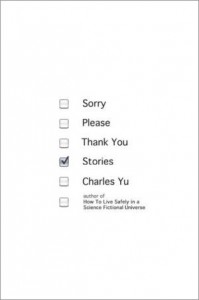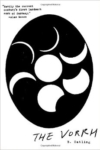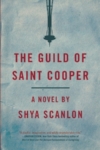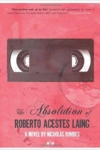When even emotions can be outsourced, what happens to human life, dreams or grief? If you could pick a lifestyle, what would you want it to give you? Drama? Closure? A sense of purpose, or importance? Do you think it would take a zombie attack for you to ask out that girl you like? And what do you think would be included in a handbook for aliens posing as human beings, anyway?
The thirteen short stories — six new stories and seven reprints — collected in Charles Yu’s new book Sorry Please Thank You are by turns tragic or funny, and often both. Though they are never boring, most of these stories evoke a sense of familiarity that is undoubtedly due to certain characteristics of Yu’s own voice and to his established use of genre tropes. Sorry Please Thank You is Yu’s third book; though many will know him from his 2010 debut novel, How To Live Safely In A Science Fictional Universe, this is Yu’s second short story collection after Third Class Superhero in 2006.
Yu’s stories remain intriguingly open-ended, a function that is as much a part of their length as it is of Yu’s particular approach to the speculative genre. (It seems customary to refer to fiction that contains elements of the fantastic but appears more literary in bent as “speculative” fiction. Perhaps this is to forestall any argument over whether something is “science fiction,” with all the pejorative connotations that label holds.) His fiction does not resist the “speculative” designation — the titles of Yu’s first two books should indicate that much — although there are moments in this collection where that adjective is more literal than its typical usage, and seems to refer instead to an apparent starting point of “what if…” rather than to any expected tropes of science fiction.
This is not to say that Yu avoids genre conventions, or even always subverts them. The strongest pieces in this collection are those like “Open” or “The Book of Categories,” where Yu takes a more obviously magical realist approach to unusual situations, from the unexplained appearance of a giant word and then a door in the apartment of a troubled couple, to a book with strange “(apocrypha)-chemical-thermo-ephemeral properties” that allow its user to infinitely divide the pages. In “The Book of Categories,” “Human For Beginners,” and “Troubleshooting,” Yu uses recognizable forms, such as catalogues or the instructional handbook, and injects an element of the fantastic to morph them into vehicles for a series of meditations on the nature of desire, loss, and familial bonds.
My personal favorite is “Inventory,” which is interestingly similar to Yu’s debut novel in that its protagonist seems to be an alternate version of Yu himself. There is very little text on each page of this story: most pages have four to five sentences, and it is a rare page that is filled with text. The narrator of “Inventory” has no stable sense of self, and wakes up in a “different universe” every day. Slowly (for a short story), you discover that this narrator exists only in the spaces between “Charles Yu’s” awareness, and has little knowledge of Yu’s emotions. He is a “hypothetical” version of Charles Yu, and as such, he has to “rely on inference” in order to come to any conclusions about his (Yu’s) life. When the narrator encounters the absence — rather than the presence, of course — of the new woman in Yu’s life, it is through a note left on the bedside table that he discovers when “taking inventory.” Is the note that she left for him, or for Yu? The narrator’s imagined interactions with her are strangely compelling. She is, he believes, a “mathematical truth in a dead language in a place that had been forgotten, by a man who never existed.” “Inventory” is at its heart a love story, but it is an enigmatic love story told through absences, through the spaces between interactions, in possibilities and hypotheticals.
As with any collection, there are stories that are less successful. “Hero Absorbs Major Damage” and “Yeoman” rely on a certain type of foreknowledge to allow the reader to “get” the joke. In the case of “Yeoman,” it’s the running joke that the “redshirts” on planetary missions in the Star Trek shows always die, and usually horribly. “Yeoman” is told from the point of view of one of these characters, which would seem to be an amusing concept, but it’s ultimately unfulfilling. Similarly, “Hero Absorbs Major Damage” is told from the point of view of a main character in a fantasy role-playing game who carries on the game after the player has left: an interesting device, but unfortunately, I found myself thinking Terry Pratchett carried it off more successfully back in 1992. (Not a desirable comparison.)
We look to genre fiction for something specific; something that the structure of genre can fulfill in ways that “literary fiction” does not — perhaps cannot. The same, of course, is true of the inverse; literary fiction involves an expansion of horizons, and a text that adheres precisely to convention cannot hope to accomplish that. Literary genre fiction promises to subvert the genre in “unexpected” ways, but those ways become tropes themselves, eventually. Perhaps I’m overly conservative when it comes to genre fiction: I see something so promising in the simple conflicts of a space opera, and most attempts to subvert that only end up seeming twee. Sorry Please Thank You is always enjoyable, but the few stories that stand out are the ones that refuse the comfort of the inside joke.
This post may contain affiliate links.








